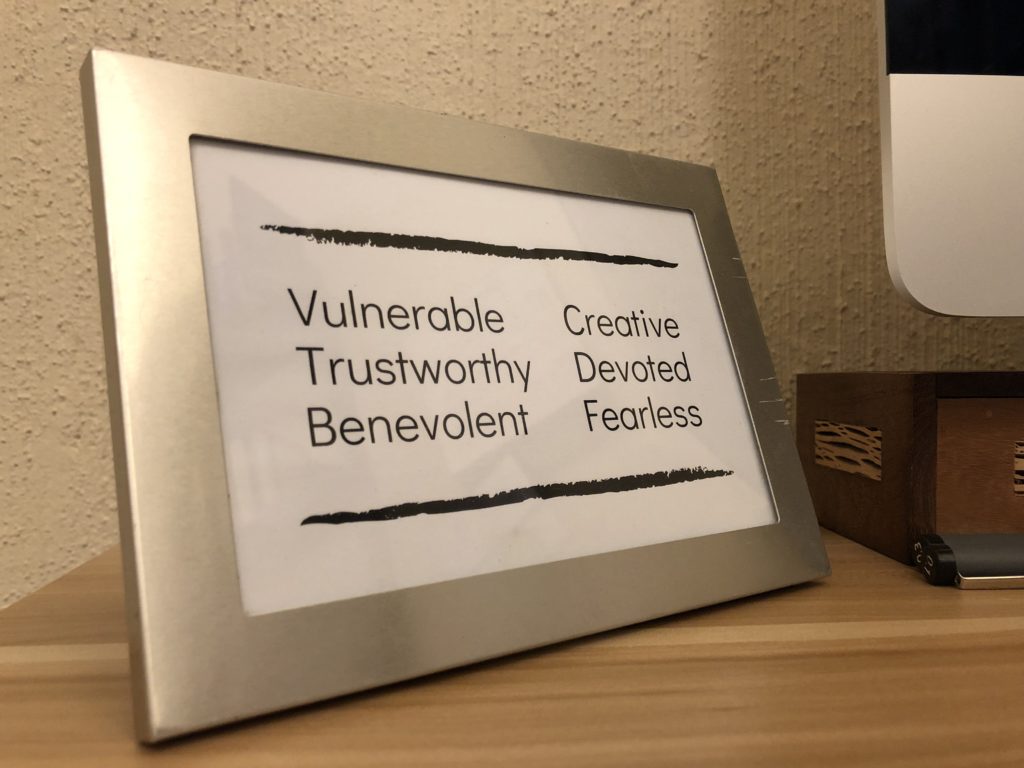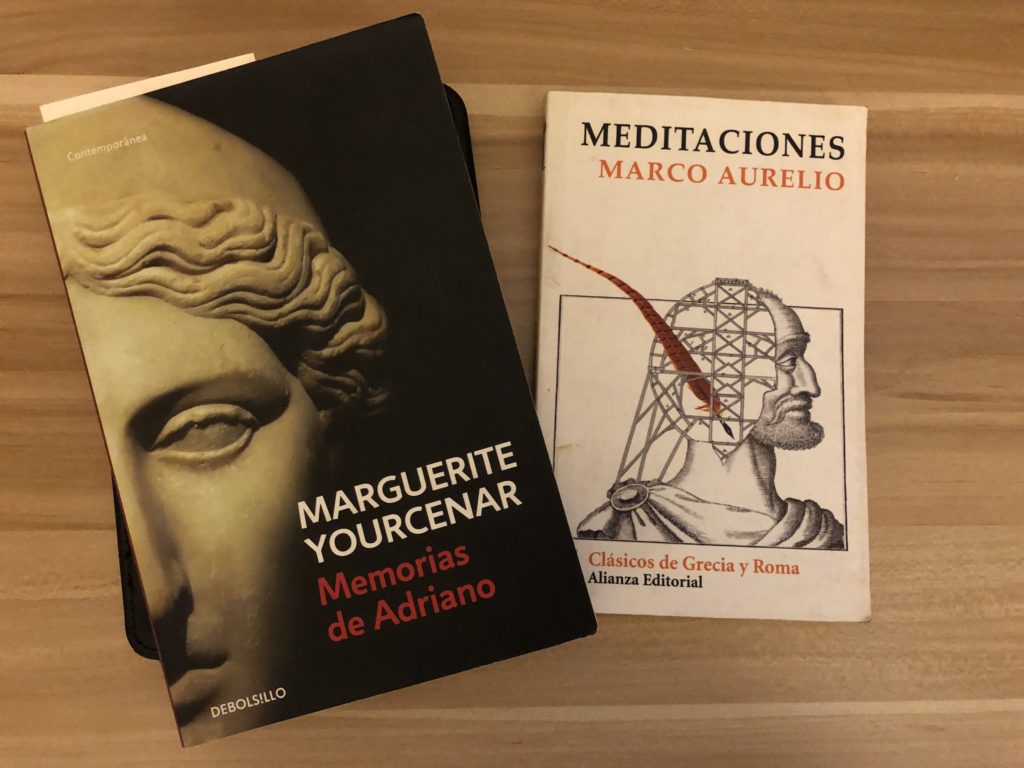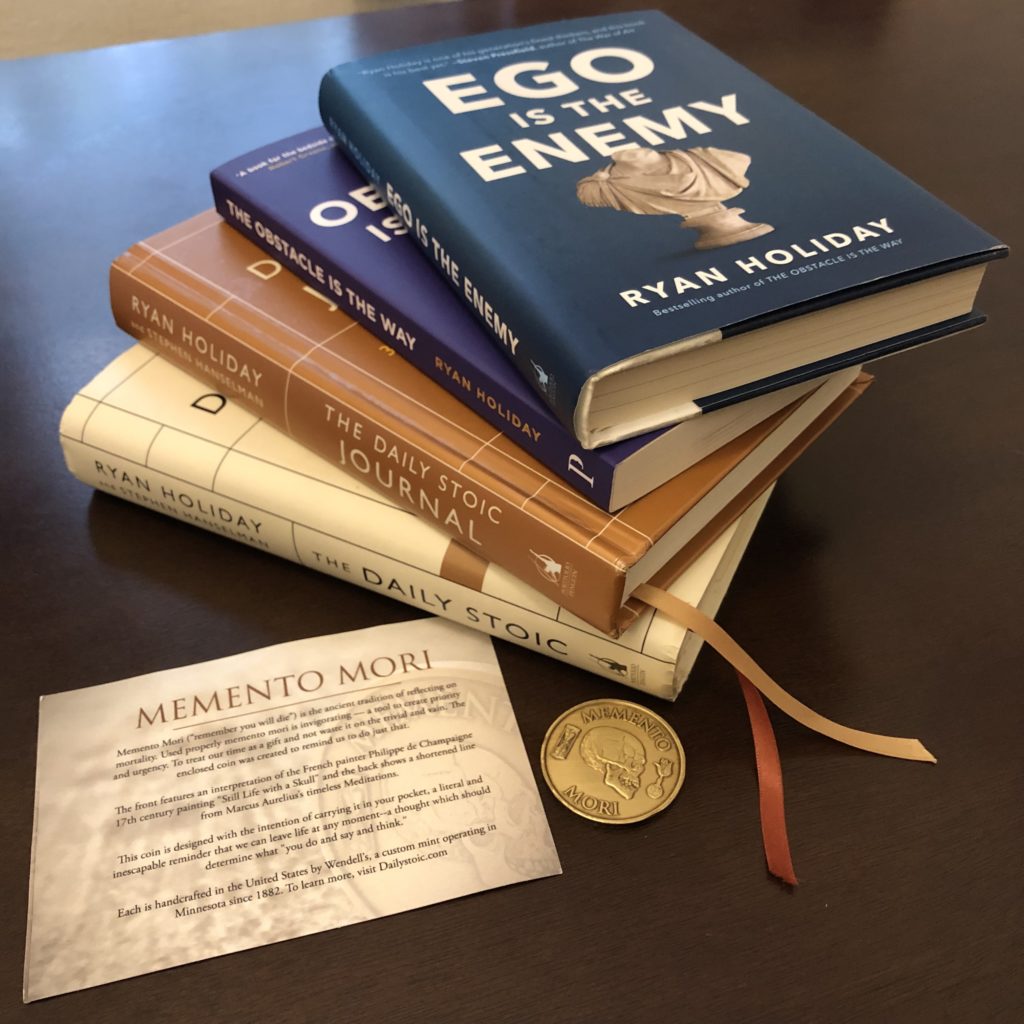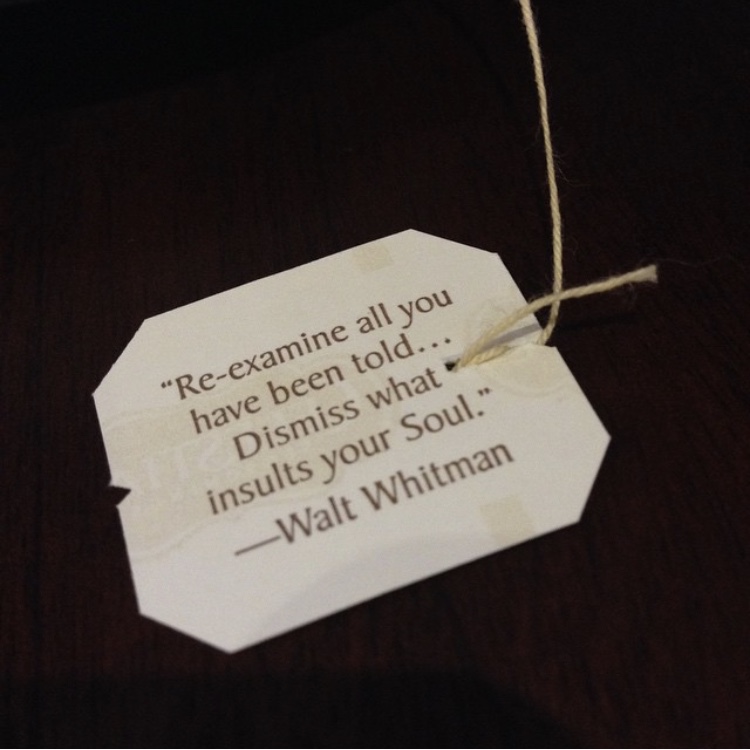
“It’s time to stop being vague. If you wish to be an extraordinary person, if you wish to be wise, then you should explicitly identify the kind of person you aspire to become”.
Epictetus, Art of living
This is the story of how I arrived at the six words pictured above to live my life by. A story that spans for a period of almost two decades, and some mysterious, yet very well received and
During my college years, my favorite bookstore had a branch store inside my campus. In hindsight, this was one of the most influential
I don’t know how many books I bought there. But two of them have had, and continue to have a visible impact on the way I see the world and live my life. The first one was ‘Meditations’ by Marcus Aurelius, and the second ‘Memoirs of Hadrian’, by Marguerite Yourcenar.
I bought them independently, with considerable time apart. I devoured Marcus Aurelius’s ‘Meditations’, without really knowing who he was or how that book came to exist. I even naïvely assumed, as ignorant as I was about history, that all emperors were this wise -or aimed to be. And I just thought Marcus Aurelius happened to become one of the ‘popular’ ones. Back then, the greatest reference I had to Roman history was a few episodes of HBO’s TV series (Rome).
Despite my ignorance, I couldn’t put this little book down. I was mesmerized, moved and even a bit confused. But I lacked the intellect, maturity or criteria to even begin to ponder what those pages were doing to me. I was 19 or 20 years old. Nevertheless, I kept the book in my bed table and has been there for the most part of my life ever since.
A couple of years later, the mother of my girlfriend was re-reading a book that shook and hypnotized her in a way I’d never seen her before. One day, lost in her thoughts, she recommended the book emphatically. The book was ‘Memoirs of Hadrian’. I bought it soon enough but didn’t read it right away.

(Marcus Aurelius’s book is from 2004 though). I read these in my native language, Spanish.
I was in the final days of college, and on my way to becoming an atheist. I was brought up in a religious family and culture and was slowly finding the way of reason. Through books. Until enough reading broke that camel’s back.
This triggered the deepest existential crisis I’ve ever had, as religious beliefs had shaped pretty much everything I believed about life until then. Without religion, there was this inner void, a restlessness, and a loss of belonging so profound, that spiraled in ways I couldn’t foresee, let alone prevent or handle.
But during that time, Marcus Aurelius’s ‘Meditations’ echoed within.
Always.
The crisis persisted, I graduated and traveled through Europe as a backpacker. There were a number of elements that compounded the crisis -too irrelevant for this post- that made me feel overwhelmed, depressed and getting to see meaninglessness in the face. I was so lost. And clueless. About everything.
I had taken some books with me.
One of them was ‘Memoirs of Hadrian’.
This book is a historical novel, written through *decades* of research, committed writing and a life long passion from its author, Marguerite Yourcenar. Belgian writer, and the first woman to belong to the Académie Française. It’s written in the first person, as Hadrian, extending a letter to his future successor, none other than Marcus Aurelius. The book may have been written by someone else, but as I read it, it was Hadrian himself speaking to me. The book also shook me, educated me, broke me and gave me the most hope any book may have had given me.
And it connected beautifully to my image of Marcus Aurelius, developed through the repeated reading of his ‘Meditations’. Not to mention the serendipity of visiting places and seeing busts, sculptures
It all felt like a small, yet calculated ruse of destiny.
And both ‘Meditations’ and ‘Memoirs of Hadrian’ did something I wasn’t aware of at the time. They became an
There are a number of ways in which losing your religion can express itself. And when your head keeps getting inundated with science, secular philosophy, and
In short, what both ‘Meditations’ and ‘Memoirs of Hadrian’ did, was to provide an antidote. A cure or a strange way of inoculation against cynicism. These books drew a peculiar arc in my life between 2002 and 2004. And as mentioned above, I have since kept them close to my sight, mind, and heart.
They were far from being the only major influences in the following years, but I do see them as stepping stones to greater sources of wisdom. Especially as I discovered new forms of spirituality, devoid of religion. Both ‘Meditations’ and ‘Memoirs of Hadrian’ were an indispensable framework that later helped me bridge the gap between the human flesh and the spiritual realm.
Fast forward to 2014.
I had been studying Online Marketing and was thinking about launching my own Consulting Business, while some of my favorite authors had been commenting and recommending the
This ‘stoic philosophy’ was the one that Hadrian and Marcus Aurelius happened to have practiced and ruled his lives by. The very same I learned through the ‘Meditations’ and ‘Memoirs of Hadrian’. And I started learning about other important characters that were also stoics. Such as Seneca. And Epictetus.
And then this marketing guy, who had published two great marketing books (‘Growth Hacker Marketing’ and ‘Trust Me, I’m Lying’), published a third book, this time on stoicism: ‘The Obstacle is The Way’.
His name is Ryan Holiday.
I got that book on stoicism in audiobook format. And then in Kindle. And not that long ago I got it in paper format. In 2016 he published ‘Ego is the Enemy’. And then ‘The Daily Stoic’ and in 2017 ‘The Daily Stoic Journal’. All gotten, all read, all used. And to top all that off, he manages the site, store, and podcast at ‘Daily Stoic’.

This has been like having the expanded, updated and revised understanding to the significance, influence and meaning that ‘Meditations’ and ‘Memoirs of Hadrian’ had in me a decade earlier. It was such a refreshing reencounter with Marcus Aurelius, and the teachers he learned from.
Once again, it felt like destiny.
When I stumbled across stoicism in 2014, I was coming out of a major business setback, reinventing myself with the help of deep therapeutic work and experienced a major spiritual awakening through the teachings and workbook lessons of ‘A Course In Miracles’. All at once. Oh, and I had a full-time job as an academic researcher, which was my only source of income at the time.
I was torn between a satisfying, yet demanding job, intense therapy, daring to think about launching a new business and getting undescribable highs through spiritual and mystical episodes.
I know it was the spiritual input that kept me together. And a really sweet girlfriend I dated back then. But as I dwelled more and more in both the spiritual and psychological worlds, I became detached and fairly removed from ordinary life, which posed a problem with my business plans, job
Stoicism provided the perfect solution.
It grounded me.
It connected me to practical matters.
Without losing the spiritual and psychological awareness that took some time (years, actually) to fully sink in.
Life can be pretty unforgiving. Even unfair at times. Sure, it’s all relative, but for some time I believed that I’ve had a heavier share of penalties in life compared to many of my fellow humans. And this made me lick some of my wounds longer than needed. But I did manage to get back on my feet and start moving. And it was Stoicism what pushed me through any loose ends.
Spirituality gave me a proper perspective
Therapy allowed me to heal and rebuild myself.
Stoicism has helped me cope and put together the above in the real world.
As things had unfolded in the last few years, I started to plan and develop an intentional and deliberate sense of purpose. And this included defining myself, choosing what would guide my life. Not just as generic and good-will wisdom, but as practical principles, a moral code, a personal manifesto.
In 2017 my favorite book was Ray Dalio’s ‘Principles’. This validated my intention of having and living by personal principles. And throughout 2018 I jotted down and scribbled a number of principles to rule my life by. But I lacked the discipline or the simple-mindedness to ground what I wanted. Besides, with Ray Dalio’s book as a reference and yardstick, I always came short of something as complete. I did come up with a number of ideas and heartfelt standards though.
For instance, I chose to make official the ‘forgiveness policy’ that I’ve practiced since my first big fight as a child with one of my best friends: Always forgive. No matter what. No matter how long it takes. Until true love and compassion are felt towards the person that seemed to have done me harm. Along with gratitude. If, for nothing else, for giving me the chance to forgive. *Always*.
There are a few more, but I failed to follow through and make a proper list. And nothing felt unified, practical or completely genuine. In reality, coming up with principles of your own is a really tall order. I knew that, but it didn’t
And as last year was coming to a close, I joined a Stoic Challenge. Fourteen days long, starting the first day of the year, promoted and created by Ryan Holiday. I figured it was going to be a small investment with big returns,
Destiny strikes again.
On day four of the challenge, the task was to come up, write and frame six epithets for myself. I had forgotten this about Marcus Aurelius.
He lived by six words.
That’s it
The most powerful man in the world at the time, with access to education, all the existing literature available to him, counselors, priests and statesman, as very few men in history have had, guided the whole of his life by six words:
Upright. Modest. Straightforward. Sane. Cooperative. Disinterested.
As Ryan Holiday writes, “How clear that is. Even a child knows what that looks like. What being and not being those things look like.”I
I like Marcus Aurelius’s approach. Six words. If a Roman emperor, when Rome was at its peak, could live by six words, believing that this may be too simple or too narrow for me, would be just plain arrogance. I know there are more methods to come up with a personal set of principles. But I’m choosing this for now.
So here are my six epithets:
Vulnerable. Trustworthy. Benevolent. Creative. Devoted. Fearless.
I won’t expand or elaborate on why I chose each of the six. But they all seem to connect me with a higher sense of purpose and a degree of service oriented selflessness. That’s why I chose them. To prevent getting caught up in my ego too often, to let go more and more any need for control, and to make me remember that I’m just a speck in the universe, driven by something bigger than my petty self.
This article may give the impression that most of my life revolves around Stoic Philosophy. T
That’s not the case.
In fact, if I list my top three intellectual priorities, my life is first informed by spiritual wisdom. Second, the main body of philosophical knowledge I structure my work around these days is the Integral Model from Ken Wilber.
And then, third, there’s Stoicism.
Which is a body of knowledge that can prove beneficial to anyone, at any given point, regardless of education, religion, level of consciousness or cultural background -which is not the case with the spirituality or philosophy I practice and work
I don’t share this so you follow my advice.
I just present the case of Marcus Aurelius, Hadrian and Stoic Philosophy.
And I share it publicly to make myself accountable. And if you’re reading this, you have my permission to call me out if you ever see me drifting away from these epithets.
It doesn’t have to be your way of living. But do find a way of living. That is conducive to a greater sense of purpose and a better version of yourself.
If you read this far, I’m sure you deserve to give yourself the gift of philosophy. And stoicism happens to be a proven, accessible, and practical option. While you ponder on this, keep in mind the quote below by Walt Whitman:

whom happens to have greatly benefited from Stoic Philosophy as well.
